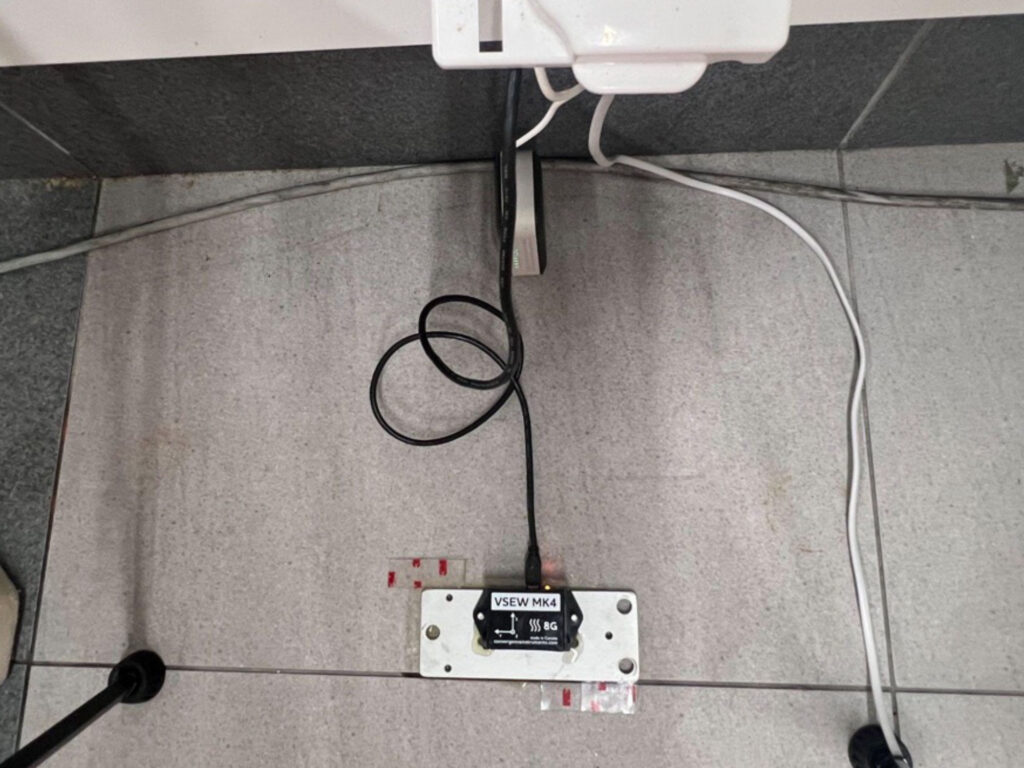
Geolab (M) Sdn Bhd brings a wealth of experience in environmental monitoring, particularly in complex urban construction projects. For the Petronas Podium project, Geolab employed state-of-the-art monitoring technologies from Convergence Instruments, a leading provider of high-precision environmental sensors. These sensors were critical in ensuring accurate real-time monitoring of both vibration and noise.
Monitoring at a sampling frequency of 4 kHz, these sensors can detect even minute vibrations with a high degree of accuracy. This ensures the integrity of critical structures like the shared diaphragm wall is monitored continuously.

With a bandwidth of 20 kHz, the type I noise sensor datalogger stores maximum and equivalent continuous sound levels (Leq) every minute, providing comprehensive acoustic data.
The deployed sensors for vibration and noise monitoring were installed in key areas around the construction site to gather localized data. The sensors’ high sampling rates enable precise detection of potential issues, including subtle changes in environmental conditions. Convergence Instruments’ reputation for reliability and scientific-grade precision in sensor manufacturing ensures that the data generated is both accurate and actionable.
The instruments chosen were the MQTT versions, which enables their integration into a custom-designed cloud-based system.
The data collected by these sensors is transmitted over the internet using the MQTT protocol, a lightweight, real-time communication standard ideal for IoT applications. The system is designed to transmit live data to a central server, where a Python-based program subscribes to the data stream. This program records the data and publishes it to the Geolab website: [Geolab Monitoring System], using Plotly for dynamic, interactive visualizations. Plotly, known for its robust visualization tools, enables stakeholders to view live and historical data with ease.
To enhance user accessibility, Geolab implemented an alert system integrated with **Green API**, which facilitates scheduled WhatsApp reports. This system sends stakeholders updates every eight hours (08:00, 16:00, and 00:00) containing both vibration and noise level summaries. This integration ensures that project stakeholders receive frequent, timely updates even if they are not actively monitoring the data.
In addition to scheduled updates, the WhatsApp alert system delivers immediate notifications when monitored values exceed preset thresholds. The Green API platform simplifies this integration, allowing for real-time communication and easy access to critical information. Stakeholders can also query the monitoring system at any time through the WhatsApp interface, providing flexibility and instant access to data as needed.
The monitoring framework includes a three-tier alert system to notify stakeholders when measured values exceed predefined thresholds. These thresholds are set based on regulatory standards and best practices in environmental monitoring.
When alert levels are exceeded, the system sends out real-time notifications via WhatsApp and triggers alerts on the web platform, allowing the construction team to take immediate action to mitigate any risks. This ensures that potential issues are addressed before they escalate into significant problems, protecting the integrity of nearby structures and reducing the risk of non-compliance with environmental regulations.
Beyond real-time alerts, the monitoring system includes a **Telegram bot** that enhances user accessibility by enabling stakeholders to access real-time data via instant messaging. This bot allows project managers, consultants, and contractors to query the system for vibration and noise levels at any time, improving decision-making processes and ensuring that relevant parties are always informed about the site’s environmental conditions.
The bot’s ability to respond to specific queries on-demand makes it a valuable tool for construction teams working under tight schedules, allowing for quick assessments of whether ongoing activities are within safety limits. This level of transparency fosters accountability and compliance, making it easier to track environmental performance in real-time.
The real-time vibration and noise monitoring system for the Petronas Podium project demonstrates the effective use of advanced environmental monitoring technologies and IoT-based communication protocols in the construction industry. Geolab (M) Sdn Bhd, in collaboration with Convergence Instruments and through the innovative use of Green API for WhatsApp alerts, has delivered a robust and responsive solution. The system not only ensures regulatory compliance but also safeguards critical infrastructure near the construction site.
By integrating high-precision sensors, real-time data transmission via MQTT, dynamic visualization through Plotly, and a comprehensive alert system, this project exemplifies how modern technology can be leveraged to enhance environmental monitoring. The inclusion of scheduled reporting and the ability to query real-time data via WhatsApp and Telegram bot further cements this approach as a model for future construction projects in sensitive urban areas.
**Geolab (M) Sdn. Bhd.** remains committed to excellence in environmental monitoring, combining expertise with innovative technologies to ensure that safety, compliance, and performance are consistently maintained in all their projects.
Convergence Instruments 2024 © All Rights Reserved | Privacy Policy and User Agreement | Terms and Conditions | Limited Warranty